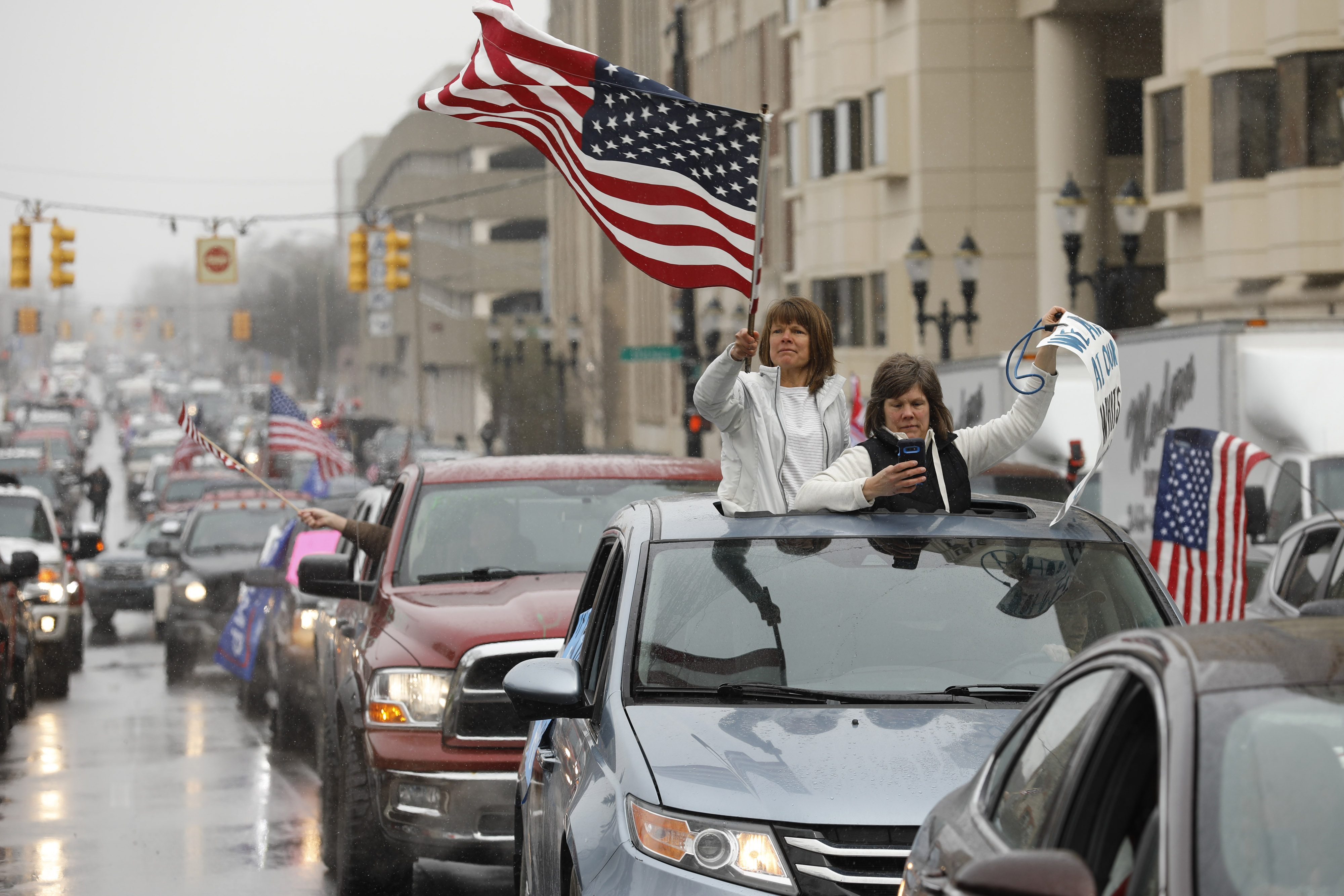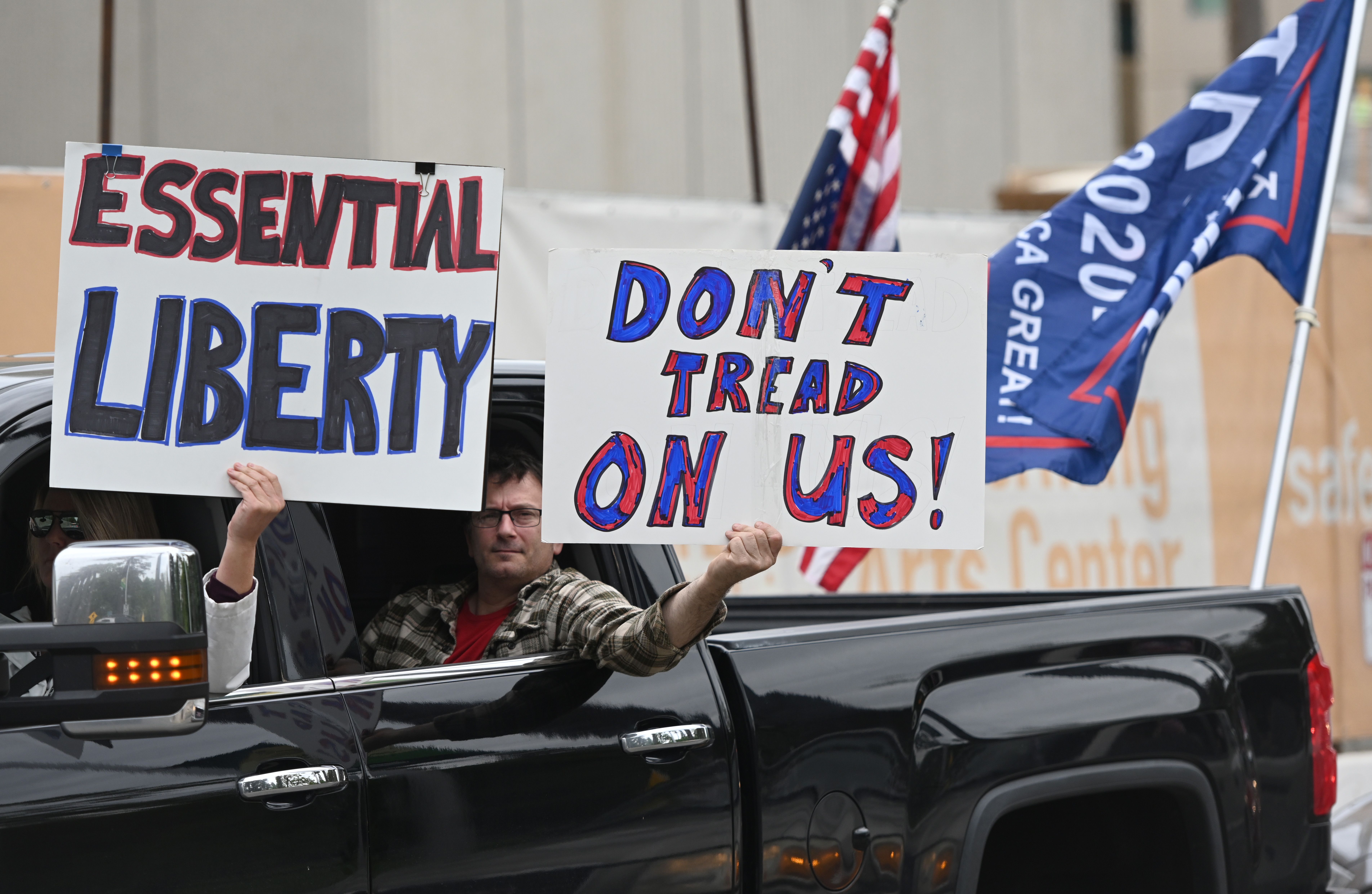A plumber in Washington state who believes government overreach might lead to violent conflicts. A teacher in Texas who is fed up with the closures of small businesses and popular hiking trails.
A farmer in Wisconsin seeing demand for the food that he produces hollowed out along with the restaurant industry.
Restless, frustrated and fearful for the future, thousands of Americans have shown up at rallies across the country and plan to attend more demonstrations in the coming weeks, including one in Madison, Wisconsin, on Friday. Their numbers may be small, as a portion of the population. And their reasons for coming vary. But at least some seem to represent a real and urgent sentiment: Staying home without work or income is hard. They are in the minority among Americans, most of whom have indicated in polls that they support restrictions until the coronavirus outbreak that has killed more than 42,000 people in the U.S. ceases. Medical experts caution against reopening the nation too rapidly, and have raised concerns about the risk of spreading the virus during the public demonstrations.
They are in the minority among Americans, most of whom have indicated in polls that they support restrictions until the coronavirus outbreak that has killed more than 42,000 people in the U.S. ceases. Medical experts caution against reopening the nation too rapidly, and have raised concerns about the risk of spreading the virus during the public demonstrations.

People in their vehicles protest against excessive quarantine orders from Michigan Governor Gretchen Whitmer. Source: JEFF KOWALSKY/AFP via Getty Images
Many of those who have joined the demonstrations are strong supporters of President Donald Trump, hoping to build conservative energy for his reelection and respond directly to his dictates on Twitter to “liberate” the states. Some have seized the moment, and the attention of television cameras, to wave Confederate flags or promote open-carry laws by wearing assault rifles and ammunition strapped to their chests.
But there are also protesters who have joined in an attempt to get the attention of their governors, who they believe are out of touch with the growing burdens the virus has placed on the working class. They say they have suffered disproportionately from the extended stay-at-home orders and mass closure of businesses while elected officials and white-collar professionals are feeling only minor discomforts.
Michigan
‘This was not a Trump thing.’
One of the largest protests sprang up after Gov. Gretchen Whitmer, a Democrat, extended a stay-at-home order for Michigan until May. Two conservative groups created and promoted a Facebook page, Operation Gridlock, that called for people to drive to Lansing, the capital, and honk their horns to protest the extension.
Tony Daunt is the executive director of one of the groups, the Michigan Freedom Fund, which has ties to the DeVos family, including Betsy DeVos, a member of Trump’s Cabinet. He said that as the virus spread, his group had written emails to members and editorials in local papers in support of the governor’s stay-at-home order. But as the weeks dragged on, and the jobless rate soared, people had started to hope that she might opt for some easing.
Instead Whitmer prolonged the order for another month, and included new restrictions, which barred people from traveling to vacation homes and closed off certain parts of large stores deemed nonessential: gardening supplies, plant nurseries, house paint and flooring.
“People were doing what was being asked of them, but her new order and the heavy-handed nature of it, it just seemed so over the top and arbitrary,” Daunt said. His group paid $250 for a Facebook post advertising the rally.
The rally drew all types, including a handful of people carrying military-style rifles who stood on the steps of the Capitol. But the vast majority of the 3,000 to 4,000 people the state police said had participated did so from inside their cars, participants and organisers said.
Kristi See, 39, a mother of four in suburban Detroit who owns a cleaning business, said she went to the rally to tell the political class that the shutdown was really hard for a lot of people. Some of her clients have disabilities, including one who is in a wheelchair. Her eight employees are furloughed.
“Everyone is laughing about all the closets they’ve organised and the Netflix they’ve watched, but there are so many people who are not living in quarantine that way,” she said. “Not everybody can put on their fashionable loungewear and get on Zoom.”
Phillip Campbell, 39, vice president of a pest control company in southern Michigan, said he decided to drive to Lansing to make the point to the governor that to him, the economic pain inflicted by the shutdown sometimes felt worse for society than the virus itself. Campbell said he knew the virus was dangerous. He had friends who worked in health care. But he wanted to feel confident that the sacrifices he was making were being taken seriously.
“There was just this gnawing sense that the response was not proportionate and I wanted to let her know that I felt that way,” said Campbell, whose company employs about 30 people. “This was not a Trump thing. This was very much about working people and our livelihoods and not wanting to be bankrupt and go into a depression.” Campbell said the situation for many people he knows is dire. He estimated that about one-third of the people in his life are in free fall, without money for rent or food.
“People who are in high-tech white-collar environments, they use this word: ‘Just,’” he said. “Just work from home. Just go on unemployment.”
Most people he knows can’t do either of those things.
It is an incredibly hard problem, he said, with no easy answers.
“It’s like I’ve got my mom hanging from a cliff and my child hanging from the other side and I’m being told to save one,” he said, using a metaphor to reflect the clashing risks to people’s health and to their finances. “What am I supposed to do? I have the right to be frustrated with the choice.”

Hundreds of people gather to protest the lockdown in spite of shelter-in-place rules still being in effect at California's state capitol building on April 20. Source: JOSH EDELSON/AFP via Getty Images
Wisconsin
‘People want to move on with their lives.’
In Wisconsin, where a Democratic governor has imposed strict stay-at-home orders, protesters said they were chafing at the extension of those limits into May.
In Marathon County, a largely rural community in north-central Wisconsin that was the site of a rally Sunday, there have been 17 confirmed coronavirus cases and one death, leading residents to ask: Why should we be held to the same rules as places like Milwaukee and Madison, where there are bigger outbreaks?
“It’s very different in the big cities than it is in rural America,” said Jeremiah Cantrall, 22, an electrician who has so far attended three rallies around the state.
Public health experts have encouraged stay-at-home orders by pointing out that rural areas are prone to outbreaks too, and can contribute to a wider spread of the infection.
Cantrall, a Republican, was laid off three weeks ago, and hoped he would be rehired when businesses start to open again.
When Gov. Tony Evers extended his stay-at-home order to May 26, Cantrall thought he had gone too far. “People want to move on with their lives,” he said.
At Sunday’s “Open Wisconsin” rally, which was held in Mosinee and drew more than 1,000 people, many people showed their support for Trump with red hats and T-shirts. Sean P. Duffy, a former member of the House of Representatives and a Republican, attended with his family. The director of a food pantry spoke about the devastation facing local families.
“This is really affecting our business,” said Dan Cihlar, a farmer who attended. “Politicians still get paid for what they do, and yet they tell us that we can’t work or keep their business open.”
Washington state
‘It’s heading to a very dark place.’
At a protest in Washington state that drew some 2,500 people Sunday, rebellion was a central theme.
Protesters held up signs of disobedience, including “Resist Like it’s 1776.” An organiser touted the gathering as the anniversary of the “shot heard round the world” that marked the beginning of the Revolutionary War.
Among the attendees were far-right groups including the Three Percenters militia, named after how many colonists the group believes took up arms during that conflict.
Mike Ladines, who attended the event waving a Three Percenters flag, said he didn’t want to see the country head toward any sort of war, but added that “history repeats itself.”
“We’re trying to do this in a peaceful way, but you can only get pushed into a corner so far,” Ladines said.
Ladines, a plumber who has continued working during the restrictions, saw the gathering as a battle for the rights of his grandchildren. He said he was worried that the mandates of the government could set a new standard for how much leaders are willing and able to control the actions of citizens.
The event included other fringe groups, including those with conspiracy theories about vaccines or the government. Some elected Republicans and candidates for office were in attendance.
One of them, state Rep. Robert Sutherland, drew rousing applause when he called for a “revolution.” He encouraged people to take control of their own lives and decide on their own whether to open their business or go out to activities, regardless of the advice of public health experts.
In an interview, Sutherland said he didn’t intend his use of the word “revolution” in a violent sense. But he predicted that more people would begin pushing back if the government continued to extend its mandates or cracks down on people violating orders.
“It’s heading to a very dark place,” Sutherland said.


